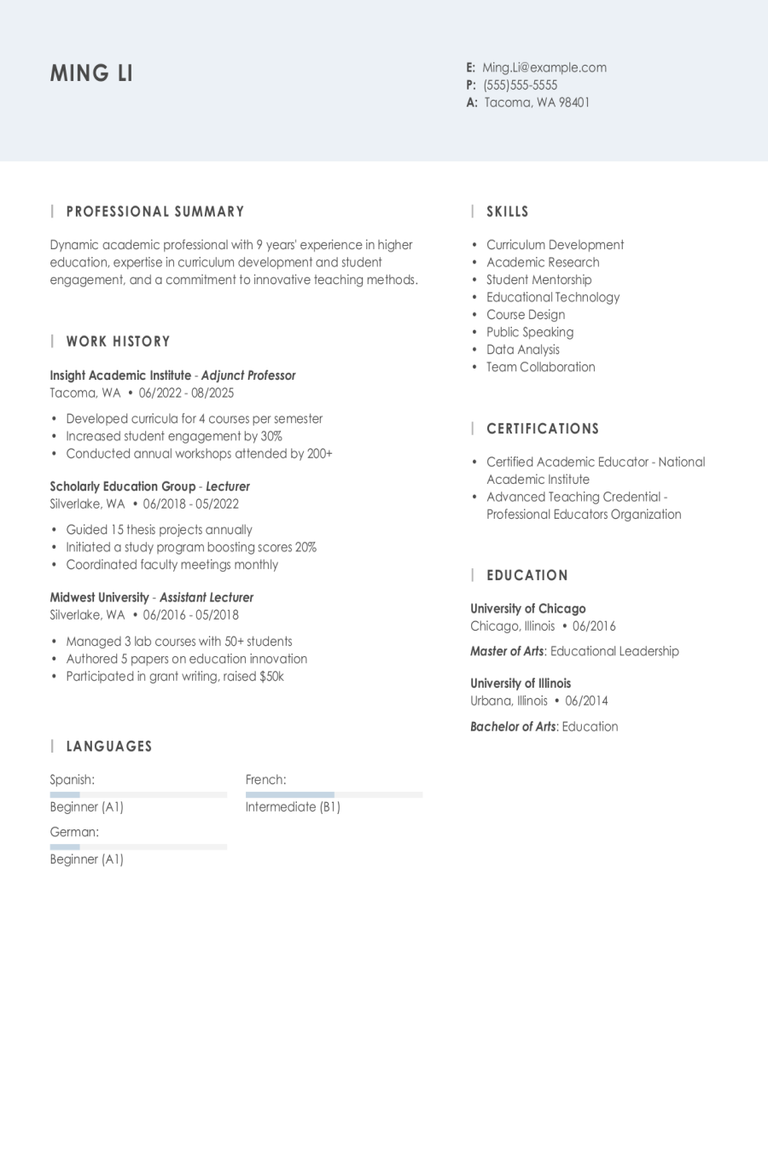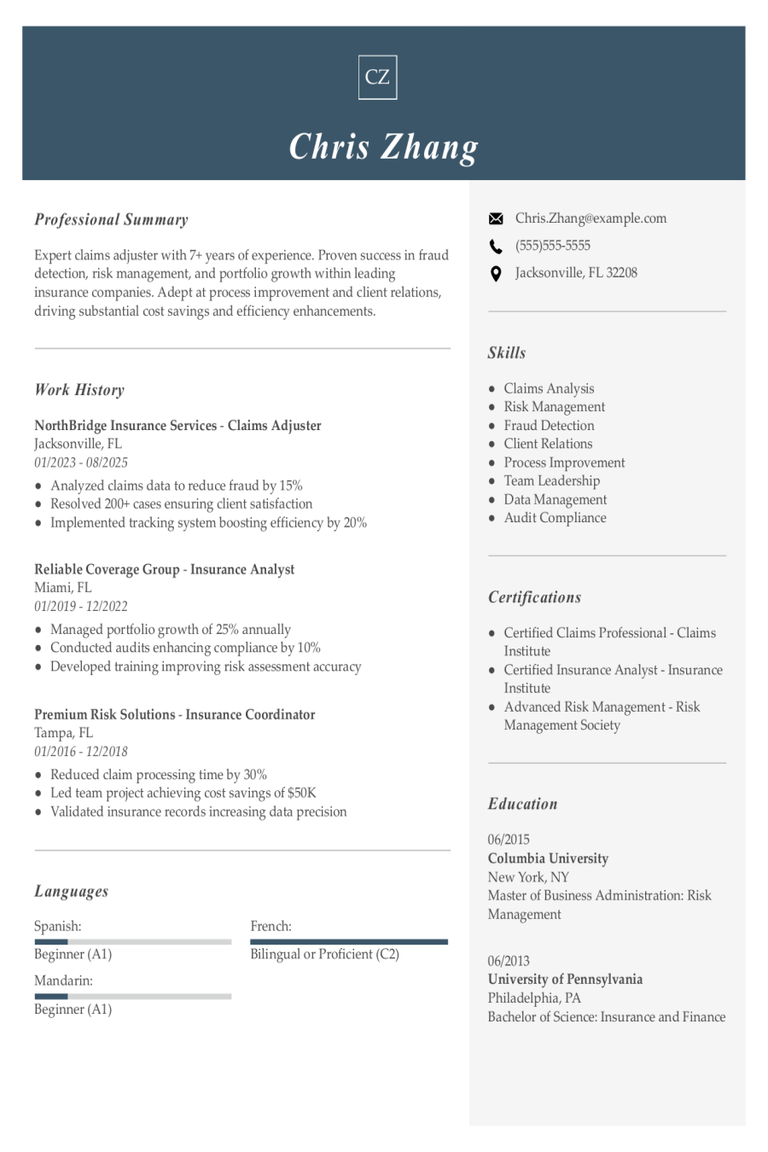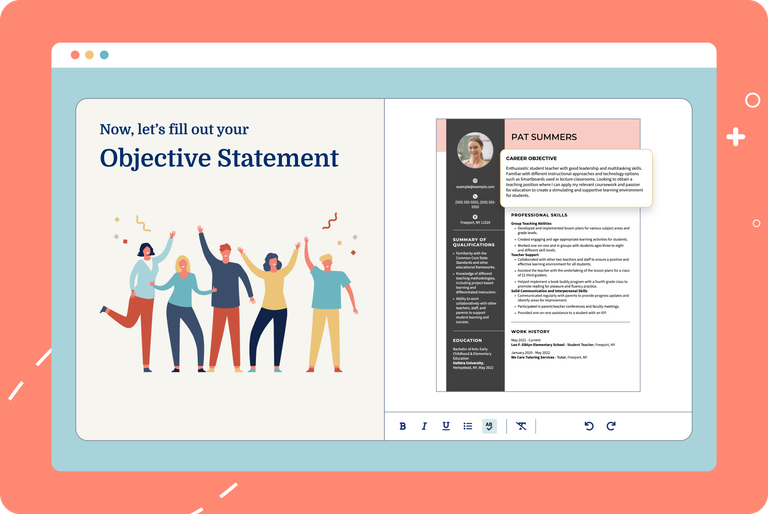Table of Contents
Get started with MyPerfectResume today!
- Build a resume on any device
- Pick an ATS-friendly template
- Tailor with AI copy suggestions
Why this resume works
- Quantifies accomplishments: Detailing measurable accomplishments like a 20% increase in audience engagement and managing over 10,000 tracks, the applicant reveals significant impact.
- Uses action-oriented language: Strong action verbs such as “boosted,” “optimized,” and “developed” illustrate initiative and effectiveness.
- Highlights industry-specific skills: The applicant’s resume highlights industry-specific skills like live sound mixing and playlist curation, essential for roles in music production and event coordination.
More Entertainment Resume Examples
Explore more entertainment resume examples to see how to effectively showcase your creativity, technical skills, and event management experience. These resume samples will help you build a resume that highlights your ability to entertain and engage audiences.
Music Producer
Why this resume works
- Centers on academic background: The education section highlights advanced degrees in music production and audio engineering, emphasizing the applicant’s dedication and expertise in their field.
- Puts skills at the forefront: Using a skills-based resume format, this applicant effectively highlights important abilities such as sound mixing and artist collaboration.
- Shows digital literacy: Showcasing expertise in audio editing and studio management reflects strong computer skills, underlining readiness for digital challenges in modern music production.
Musician
Why this resume works
- Points to measurable outcomes: By composing over 15 original tracks generating 80K downloads, the musician showcases an ability to deliver impactful results through creative output.
- Demonstrates language abilities: Language skills in Spanish, French, and Italian indicate the applicant’s ability for cross-cultural collaboration within diverse musical projects.
- Displays technical expertise: Certified in advanced sound engineering, the applicant’s technical prowess enriches studio recording techniques important for high-quality music production.
Actor
Why this resume works
- Showcases impressive accomplishments: The applicant’s impressive accomplishments are highlighted through standout roles, like leading in award-winning plays and starring in festival-winning films.
- Sections are well-organized: Using bullet points to detail performances and achievements, the applicant ensures each section is organized, improving readability and making their resume easy to scan.
- Emphasizes leadership skills: Taking charge by conducting workshops for aspiring actors reveals the applicant’s leadership skills and ability to foster growth within creative communities.
DJ Resume Template (Text Version)
Olivia Davis
Parkview, MO 64164
(555)555-5555
Olivia.Davis@example.com
Skills
- Live Sound Mixing
- Track Selection
- Audience Engagement
- Sound System Setup
- Playlist Curation
- Event Coordination
- Creative Mixing
- Audio Editing
Languages
- Spanish – Beginner (A1)
- French – Beginner (A1)
- German – Intermediate (B1)
Professional Summary
Dynamic DJ with 8 years of expertise in music mixing, playlist curation, and live sound. Proven track record in elevating event engagement by 20% and delivering seamless audio experiences. Skilled in audience interaction and creative soundscapes.
Work History
DJ
SoundWave Productions – Parkview, MO
May 2023 – July 2025
- Mixed live sets for over 15 events monthly
- Increased audience engagement by 20%
- Managed music library of 10,000+ tracks
Music Mix Specialist
Harmony Beats Entertainment – St. Louis, MO
May 2019 – April 2023
- Developed playlists for 50+ clients
- Boosted client satisfaction rating by 30%
- Coordinated audio needs for 100+ events
Audio Technician
Rhythm Sound Solutions – Parkview, MO
May 2017 – April 2019
- Configured sound equipment for live shows
- Optimized sound quality increasing clarity by 50%
- Trained 5 junior technicians onsite
Certifications
- Certified Professional DJ – International DJ Association
- Advanced Audio Engineer – Audio Engineering Society
Education
Master of Arts Music Production
University of California, Los Angeles Los Angeles, CA
May 2017
Bachelor of Science Audio Engineering
New York University New York, NY
May 2015
Related Resume Guides
Advice for Writing Your Dj Resume
Explore our tips on how to write a resume for a DJ position and discover how to highlight your musical talents, performance experience, and ability to energize any crowd.
Showcase your portfolio or projects
For a DJ, including a portfolio or projects on your resume is essential. Sharing your mixes, live sets, collaborations, and past gigs allows potential clients or employers to experience your sound, style, and ability to engage a crowd. It’s not just about playing music, it’s about how you shape the energy of a room and create memorable experiences on the dance floor.
To make your portfolio truly stand out, consider building an online presence on platforms like SoundCloud, Mixcloud, or even YouTube, where people can easily explore your work. A personal website can also help you present your best projects, upcoming events, and contact info in one place.
Don’t hesitate to include freelance gigs, school projects, or personal mixes; each one adds to the story of your growth and range as an artist.
When listing projects on your resume, treat them like professional experience. Include the project name, any venue or client involved, a brief description of the event or collaboration, and highlight your role, whether it was mixing a live set, curating a theme, or energizing a specific type of crowd.
Show how your contributions added value, such as drawing a larger audience or enhancing the overall vibe of the event. For tips on formatting these entries, check out our guide on how to list projects on your resume. A well-curated portfolio not only highlights your current skills but also shows your development as a performer and your ability to adapt to different settings and audiences.
Example of a projects section
Summer Music Festival DJ Set
Soundwave Music Festival
July 2023
- Curated an engaging 2-hour set that attracted over 5,000 attendees.
- Mixed a diverse range of genres, including electronic, hip-hop, and pop, to maintain high energy levels throughout the event.
- Incorporated live remixing techniques using Serato DJ Pro to create unique sound experiences.
Weekly Radio Show Production
Urban Beats Radio Station
Jan 2022 – Dec 2022
- Hosted and produced a weekly radio show featuring emerging local artists.
- Collaborated with station engineers to improve audio quality and streamline broadcast processes.
- Built a dedicated listener base by interacting with fans through social media and live call-ins.
Need ideas for your resume? Explore our professional resume examples to see how others highlight their skills and experience.
Emphasize your most relevant skills
In creative roles like a DJ, both technical and soft skills play a big part in success. Technical abilities, such as mixing software expertise and sound equipment knowledge, are the backbone of delivering quality performances. Soft skills like communication and adaptability help connect with audiences and adjust to different event vibes.
Balancing these two skill sets not only improves your work but also shows potential employers that you can handle the artistic and interactive sides of the role. Consider adding a skills section to your resume to spotlight tools and talents specific to being a DJ.
This could include programs like Ableton Live or Serato DJ, along with creative abilities like beatmatching or playlist curation for diverse crowds. Listing these clearly in one area helps hiring managers quickly see what you bring to the table while staying focused on what matters most.
To make your skills stand out even more, weave them into your work experience descriptions. Instead of just saying you performed at events, explain how you used sound editing software to craft unique mixes or adjusted playlists on the spot based on audience reactions. Showing how these skills are applied in real-life situations makes them more impactful and memorable for anyone reviewing your resume.
Opt for a resume format that effectively highlights your music mixing skills, ability to engage audiences, and event coordination expertise.
Choose a professional resume template
When selecting a resume template for a DJ role, it’s essential to find one that showcases your creative side while still looking professional. A clean and structured layout highlights your skills and experiences without overwhelming the reader with excessive design elements. Seek out templates that use clear headings and sections so your resume is easy to read, even at a glance.
Ensure the template you pick is optimized for ATS (applicant tracking systems) compatibility. This means steering clear of overly decorative fonts or complex graphics that might confuse these systems, which some companies use to sort through applications.
A straightforward, visually appealing format with a strong visual hierarchy ensures your key information stands out, like your experience mixing music or performing live gigs.
By balancing creativity with professionalism in your resume template, you’ll present yourself as an organized yet innovative DJ ready to tackle new challenges. This approach will help you catch the eye of hiring managers who value both artistic flair and reliability in their performers.
Use our AI Resume Builder to easily create a standout DJ resume. The tool offers templates that make your skills and experience shine.
Format your resume properly
Proper resume format helps make your skills and experience stand out. For a DJ, if you have extensive gigs and experience to show, a chronological resume works best. It lets you list your events in order, showing growth over time. If you’re just starting, use a functional resume to highlight your music skills and creativity.
5 resume formatting tips
- Structure with clear sections: Use headings like “Work Experience,” “Skills,” and “Portfolio” for easy navigation.
- Choose readable fonts: Opt for consistent fonts such as Arial or Calibri in 10-12 pt size.
- Use bullet points: Present skills and achievements using bullet points to improve scanning.
- Limit to one page: Aim for a single-page resume unless you have extensive experience.
- Ensure proper spacing and alignment: Maintain clear alignment with adequate spacing for a clean appearance.
Make sure your resume shines! Try our ATS Resume Checker to find any formatting slip-ups, missing keywords, or layout issues before sending in your application.
FAQ
Do I need to include a cover letter with my DJ resume?
Yes, including a cover letter with your DJ resume is your opportunity to showcase your unique style, musical influences, and the passion that sets you apart from other performers.
Use your cover letter to highlight specific venues, events, or collaborations you’ve been part of and explain how those experiences align with the role or gig you’re applying for.
If the venue or event focuses on a particular genre or setting, like electronic festivals, weddings, or upscale lounges, mention your experience in that niche to show you’re a strong fit. Referencing cover letter examples can inspire and ensure yours is compelling and targeted.
You can also use your cover letter to share technical skills or gear expertise that may not fit neatly on your resume, such as your proficiency with specific DJ software, sound systems, or live mixing techniques. Consider using our Cover Letter Generator for expert tips and professional content suggestions.
How long should a DJ resume be?
For a DJ, aim to keep your one-page resume. Highlight key aspects like your experience with different music genres, notable gigs or residencies, and any technical skills such as equipment skill or sound engineering.
If you have extensive experience or unique accomplishments that are particularly relevant, extending to a two-page resume is acceptable. Include only what makes you stand out as a DJ—think signature events, collaborations with well-known artists, or specialized training. Ensure every detail adds value and showcases your musical journey.
Feel free to explore our guide on how long a resume should be for more examples and tips tailored to your career stage.
How do you write a DJ resume with no experience?
If you’re just starting in DJing, highlight your love for music, relevant skills, and any experience showing your potential. Here are a few tips on writing a resume with no experience to make your application stand out:
- Highlight technical skills: Mention any experience with DJ software (like Serato or Traktor), mixing equipment, or audio editing programs. If you’ve practiced at home or created mixes, include that to show familiarity.
- Showcase self-initiated projects: If you’ve created playlists, recorded sample sets, or performed casually at parties or events for friends and family, treat those as examples of hands-on experience.
- Emphasize transferable skills: Skills like time management, crowd reading, creativity, and communication are key in DJing. Highlight these if you’ve developed them in other roles or activities.
- Include passion-driven learning: List online courses, tutorials, workshops, or even hours spent experimenting with music production tools to demonstrate your commitment to improving.
Focus on enthusiasm and willingness to learn—qualities that can outweigh formal experience when breaking into the field.
Rate this article
DJ
Share this page
Additional Resources

Adjunct Professor Resume Examples & Templates
Browse adjunct professor resume examples that demonstrate how to emphasize teaching expertise and academic experience. Explore guidance on showcasing your ability to engage students, design effective lessons, and manage classroom

Claims Adjuster Resume Examples & Templates
Browse claims adjuster resume examples and tips to help you highlight your investigative skills, negotiation abilities, and experience handling insurance claims effectively.Build my resumeImport existing resumeCustomize this templateWhy this resume

Adjunct Professor Cover Letter Example & Templates
Here are a few essential tips to help you take your cover letter based on this free adjunct professor cover letter sample to the next level. To begin with, make

The Illusion of Wage Growth: Where Paychecks Stretch the Farthest
U.S. wages have climbed at one of the fastest rates in modern history. Between 2020 and 2024, the average American worker’s pay rose from about $64,000 to $75,600, an 18%

100+ Resume Objective Statement Examples & Best Practices
In just a sentence or two, a resume objective statement tells hiring managers the role or career path you’re aiming for and the unique skills and value you bring to

150+ Skills for a Resume: Examples for Any Job
Crafting a standout resume starts with highlighting the skills and qualifications that demonstrate your fit for the role. But in a crowded job market, knowing which abilities will actually catch
